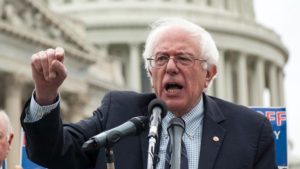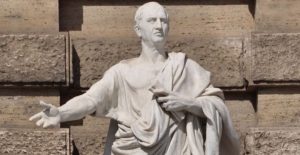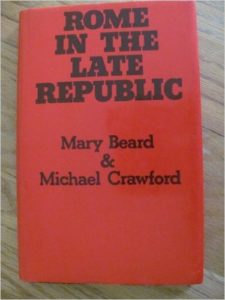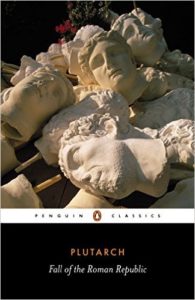Just some light reading in the final weekend before the US Presidential election. I checked Rome In The Late Republic by Mary Beard and Michael Crawford out of the library in an obvious despair-at-the-fall-of-the-West kind of mood. The first thing I learned is that the specific years of the “Late Republic” are in dispute and might span a whole century, but are roughly in the second and first centuries B.C.
Even that timeline alone could be encouraging or dismaying, when applied to the American context. Do we have a whole century of this kind of trouble ahead of us? Have we not either saved or destroyed the republic on November 8, 2016? Nope. It might just be one step in a long process.
I’ll highlight a few interesting ideas suggsted by this book include the concentration of elite wealth and power, the tensions between Roman and outlying areas in Italy, and the ‘defensive imperialism’ of the late Republic.
Concentration of Elite Wealth
Beard and Crawford explain some of the overlaps between extreme wealth and political power in Rome. The financial elite’s dominance of politics is a reminder that, while we sometimes associate “republicanism” and “democracy” with “economic equality,” we probably shouldn’t. There’s no particular historical precedent for that linkage. There was certainly nothing economically equal about political power in Rome.
Senators, three hundred men from the oldest and richest Roman families, sat on top of the political structure of the Republic. All decisions of any importance needed the approval, “the consultation,” of this financial elite. These Senators remained appointed for life.
Underneath them, institutions that represented the substrata gave some voice to others in the Republic. And these institutions purposefully weighted wealth in apportioning representation.
Roman citizens – men of property – voted to elect their representatives, often known as magistrates. A financial census explicitly sorted all voters according to their wealth.
 One popularly elected assembly, the “centuriate assembly” was comprised of of 193 voting group, known as “centuries.” The lowest members of the financial census “class” were enrolled in one single “voting century.” Member of the top financial census “class” were apportioned among seventy, assuring a huge weighted advantage to the financial elite. As Beard and Crawford explain,
One popularly elected assembly, the “centuriate assembly” was comprised of of 193 voting group, known as “centuries.” The lowest members of the financial census “class” were enrolled in one single “voting century.” Member of the top financial census “class” were apportioned among seventy, assuring a huge weighted advantage to the financial elite. As Beard and Crawford explain,
“This division gave weighted voting influence to the elite, both individually and collectively. The rich were far fewer in number than the poor, yet they were assigned to many more voting units. As a result the number of voters in those units would have been comparatively small – a few hundred in the centuries of the first ‘class,’ compared with many thousands in the bottom century. The arithmetic is obvious: the proportionate influence of a single voter in the first ‘class’ was many times greater than that of the individual voter in the lower ‘classes.'”
Anyway, it’s hard not to think of campaign contributions, income tax policy, Citizens United, and carried-interest taxation. And the financial reality that today, the elite are not “just like us!” Bernie Sanders – bless his weird old-guy ranting – is the only one who called this stuff like it is, in 2o16.
Center/Periphery mistrust
Three hundred Senators and eighteen hundred equestrians (the next rank down from Senators) held extraordinary power in the Republic, but they probably maintained legitimacy with the lower stata through patronage, and some fluidity in their ranks. In the successful years, Italians living outside of the main city could aspire, either through gaining wealth or through talent like Cicero, to penetrate the elite of the City of Rome.

Something broke down in those linkages between the Roman elite and the folks “from the countryside” in the first century B.C, however. The City of Rome changed rules and made it harder for Italians in the outlying provinces to enjoy full Roman citizenship. Poorer people began to perceive that the benefits of wealth and power were concentrating in the Rome, leaving outlanders in the Latin Colonies in the Italian peninsula further behind. Meanwhile, Rome depended increasingly on manpower from the Colonies to maintain order on the borders.
Of course I’m thinking of flyover states (including where I live in Texas) that resent the kind of snobby city attitudes towards the less educated, less wealthy, less talented provinces. The Acela corridor of Washington, New York and Boston, plus the West Coast, are a country apart from the rest, and the misunderstanding runs both ways. The Italians and Romans didn’t have Drudge Report, Huffington Post, alt-right Twitter, Fox News and MSNBC to divide citizens into impermeable media islands, through which new data and perspectives may not pass.
Beard and Crawford point to evidence that some elites in the outlying provinces suffered when Rome attempted to enact land reform, distributing wealth at their expense. This created tensions among the elites of the periphery and the center. At the lower end of the scale, Italian soldiers probably received less booty than their Roman counterparts following conquest, further exacerbating feelings between the colonies and Rome.
At the end of the Republic, the result was outright rebellion by those who felt shut out by the Roman elites.
“The effects of the processes we have described must have varied enormously from one Italian community to another and from one social level to another. But generally it is clear that, through the last decades of the second century, the Italians were becoming increasingly alienated from the Romans. In addition, tensions within the Italian communities themselves were increasing, just as they were in Rome; and these tensions no doubt played a part in alienating some communities (or some sections of some communities) even further from Rome. At the end, communications between Rome and Italy simply broke down: at Asculum, in Picenum, the Romans sent to urge restraint were murdered. War broke out. “
Defensive Imperialism
Beard and Crawford note the interesting coincidence of two simultaneous transitions – First the move from Republican government to Despotic government, and second the move from a prosperous city with Italian colonies to an empire that conquered the world (as it was understood at the time.) One transition did not necessarily cause the other, but they interacted in interesting ways. Some of the peculiar political and economic institutions such as short terms of office for magistrates and methods of taxation in both the Republic and the Empire encouraged expansive militarism, and the authors give interestesting details for this.
 Of most interest to me, however, was a point they made about how Romans themselves perceived their own military efforts. At least as a Republic, they did not glorify conquest.1 By and large, Beard and Crawford, argue, Romans believed they fought to defend themselves and their borders from outside threats. A potential alliance between Macedonian leaders across the Adriatic Sea from Rome and Syrian leaders in the Middle East required a military response from the Republic. This led to the Second Macedonian War (200-196 BC). The fact that they were successful and vastly expanded Roman territory was just a happenstance of their defensive response to threats to the Republic.
Of most interest to me, however, was a point they made about how Romans themselves perceived their own military efforts. At least as a Republic, they did not glorify conquest.1 By and large, Beard and Crawford, argue, Romans believed they fought to defend themselves and their borders from outside threats. A potential alliance between Macedonian leaders across the Adriatic Sea from Rome and Syrian leaders in the Middle East required a military response from the Republic. This led to the Second Macedonian War (200-196 BC). The fact that they were successful and vastly expanded Roman territory was just a happenstance of their defensive response to threats to the Republic.
This all just reminds me of today, where the US is of course merely defending itself from people who have attacked us, like Al-Qaeda, or who would like to attack us, like ISIS. Or defending ourselves from people who talk a big game about attacking us but really wouldn’t dare any such thing except secretive terrorist-style pinpricks and cyberattacks (Libya under Qaddafy, Iraq under Hussein, Iran, North Korea.) The expansion of our military into nation-building in Iraq and Afghanistan, and permanent military bases throughout the world, is not conscious empire-building, it’s just us playing defense. Right? Or so we tell ourselves.2
My worldview on this topic, Imperial Overreach (even in the name of defense!), was set early on by the awesome Paul Kennedy book The Rise And Fall Of The Great Powers.
In this same worried mood, I also checked from the library out Plutarch’s Fall of the Roman Republic and Gibbons’ Decline and Fall of the Roman Empire. I’ve gotten about 30 pages into the latter, but I’ve learned that I need more background, like what’s offered by the Beard and Crawford book, to understand Gibbon. Also, my present mood and concern for the election has much more to do with the decline of the Republic rather than the Empire. If I make it through either Gibbon or Plutarch or both, I’ll put up a post.
Please see related post:
All Bankers Anonymous book reviews in one place
Book Review: Plutocrats by Chrystia Freeland
Post read (309) times.
- Clearly later Roman Emperors gloried in imperial conquest, but that wasn’t the way the leaders of the Republic generally understood their military expeditions. ↩
- Of course even before this War on Terror, the US did become the number one imperial military power as a result of actually defending ourselves (and allies) from the Axis powers in World War Two. We reluctantly entered the war for defensive reasons, and ended up replacing Britain when the war ended as the policeman of the world in 1945. Will historians of the “Late US Republic,” in 3100 AD, date the beginning of our decline from 1945? ↩



